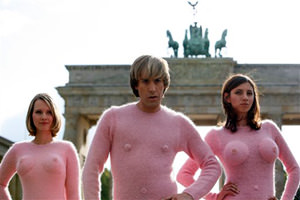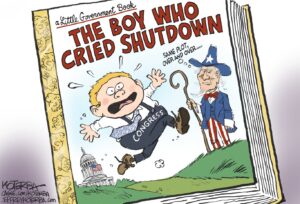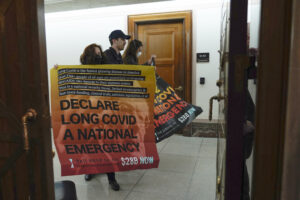Is Congress More Progressive Than Hollywood?
Who would have thought that the political capital of Washington would be ahead of the entertainment capital of Hollywood when it comes to allowing gay folks to serve openly?
Who would have thought that the political capital of Washington would be ahead of the entertainment capital of Hollywood when it comes to allowing gay folks to serve openly? Just as Congress votes to repeal “don’t ask, don’t tell,” finally permitting lesbians and gay soldiers to live their lives without hiding — well, finally, once the Pentagon actually begins implementing the newly enacted policy — Hollywood reminds its own recruits — young up-and-coming actors — that the closet is still the safest place for them if they aspire to A-list success.
Speaking to The Advocate this week, former TV heartthrob Richard Chamberlain, now 76, repeats the conventional wisdom of the entertainment industry:
There’s still a tremendous amount of homophobia in our culture. It’s regrettable, it’s stupid, it’s heartless and it’s immoral, but there it is. For an actor to be working is a kind of miracle, because most actors aren’t, so it’s just silly for a working actor to say, “Oh, I don’t care if anybody knows I’m gay” — especially if you’re a leading man. Personally, I wouldn’t advise a gay leading man–type actor to come out.
Make no mistake about it, this is the conventional wisdom of the entertainment industry, and it is often repeated and enforced by gay people themselves. It seems that every year at Outfest, the GLBT film festival in L.A., there is a panel on the topic at which openly gay behind-the-camera folks remind young actors how the game works. In July 2009, according to the LA Weekly, three-time Emmy winning and openly gay director Todd Holland said that he advises young, gay male actors to “stay in the closet. … It’s a necessary career choice if a gay actor wants to succeed in Hollywood.”
A year later, same festival, different panelists, but the same message. As recounted by blogger Greg Hernandez, this time it fell to openly gay writer-director Don Roos to give the sermon:
I think the relationship between an audience and an actor is a very complicated thing, especially in a romantic lead. When you’re in a movie theater, what’s on the screen isn’t necessarily appealing to your best instincts. Most of the audience is going to be homophobic, they’re mostly violent in their hearts and that’s what they’re responding to on the screen and you can’t wait to have a career until the audience is not homophobic. That’s never going to happen. … In a romantic role, it can be very distracting for the audience to not be able to give themselves to a particular character. … I think everybody should be out to their circle but it’s more difficult if you’re a romantic lead. … I want to not have conversations about is he gay or is he not gay; I want to know as little as possible.
I’ve previously written on Truthdig about the Hollywood closet, and the story isn’t complicated. Hollywood is in the business of selling fantasies to (mostly young) audiences, and the folks who call the shots are convinced, like Roos, that the audience needs to believe that the actors portraying heterosexual romance are, in reality, just as straight as the characters they’re portraying. Nevermind that they also know how often gay actors convincingly play straight characters; that’s not the point (and when straight actors play gay roles, it’s Oscar time!). This is a high risk, high stakes game, and anything that might damage the chances of success endangers the massive investment that every project represents.
An agent investing in the career of a young actor — one of many equally talented and appealing actors vying for the attention of any successful agent — will certainly be concerned that nothing limit that actor’s credibility in the eyes of casting directors, directors and producers as they go about selecting talent for their next movie or TV pilot.
A producer assembling the multimillion dollar package necessary to bring a movie to the screen is unlikely to take the risk of casting an openly gay actor in an action and/or romantic lead role, that is, to open the door to the A-List dressing room. And, if one of the production team — writer, director, producer — is pushing for such a bold move, you can be sure that other key players will veto the risky choice.
Media industry folks have been in the forefront of fighting to repeal Proposition 8, to offer marriage equality to lesbians and gay men; and these efforts are bearing fruit, as in the powerful decision rendered by U.S. District Judge Vaughn Walker that will lead to the inevitable Supreme Court test. At the same time, the industry ensures that the freedom to live openly and to marry someone of the same sex is not enjoyed by its own young actors if they aspire to big league careers.
Or so it has been so far, despite all the visible progress gay folks have made in being open in society, in politics, in the media. And so we have the strange juxtaposition of actual progress, however limited, in the center of political power, while the beating heart of liberal America, Hollywood’s dream factory, remains firmly committed to the preservation of the bottom line. Isn’t it time that Hollywood’s liberal activist corps, which has been vocal in supporting gay marriage and the right to serve openly in the military, turned its attention and the spotlight of its celebrity power to the challenge of freeing its own closeted prisoners?
Larry Gross is the director of the USC Annenberg School for Communication. He is an expert on media portrayals of minorities and one of the founders of the field of gay and lesbian studies.
Your support matters…Independent journalism is under threat and overshadowed by heavily funded mainstream media.
You can help level the playing field. Become a member.
Your tax-deductible contribution keeps us digging beneath the headlines to give you thought-provoking, investigative reporting and analysis that unearths what's really happening- without compromise.
Give today to support our courageous, independent journalists.






You need to be a supporter to comment.
There are currently no responses to this article.
Be the first to respond.